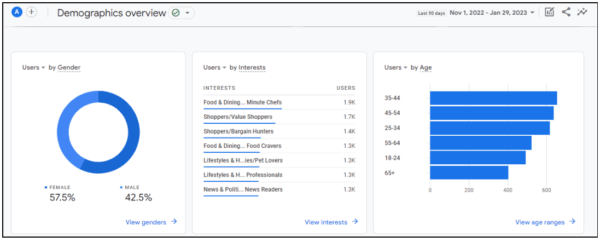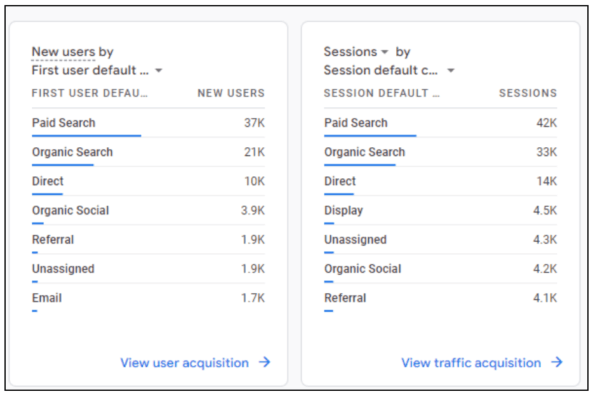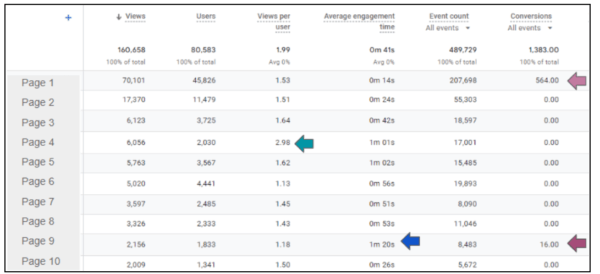Could you imagine spending tens of thousands of dollars building a website for your business, then using digital marketing to drive traffic, leads, and ecommerce, and not having a way to measure the KPIs necessary to improve marketing strategy performance?
That is what many businesses, big and small, are sacrificing when they fail to set up a tool like Google Analytics.
At (un)CommonLogic, Google Analytics is the primary way we measure and evaluate the impact of our digital marketing campaigns for our clients. Not only is Google Analytics the most widely used analytics tool, but it serves our key goals in support of data-informed strategies:
- To ensure your marketing data is accurate and consistent
- To align your marketing metrics with your strategic business goals
- To build marketing reports that guide you in making data-driven decisions
Let’s explore some of the critical pieces of marketing strategy that Google Analytics will help inform:
- Analysis of Audience Behaviors and Targeting Relevance
- Measuring and Reporting on Website Performance KPIs
- Driving Your SEO Content Strategy
- Measuring and Optimizing Toward Marketing Goals
Why is Google Analytics So Important?
Google Analytics is important because it provides website performance data that is not readily available on other platforms.
These non-website platforms include key performance insights from channels like apps, social media channels, email marketing campaigns, and referring websites that drive traffic to your site.
Without this data, business owners would have no insight into how their site is performing, where customers are coming from, or how they can improve their marketing strategies.
If you’ve ever watched Shark Tank, you’ve probably seen an entrepreneur get bit by at least one shark on the panel for not being prepared with key data about their business.
Why is this?
Because without the kind of data-driven insights Google Analytics provides, they would be wasting valuable time and money by investing in that business.
Let’s say you build a website to sell the best cupcakes in your geographic region. Imagine how much more effective your marketing and advertising budget would be if armed with the following insights:
- The typical searches someone initiates before coming to your site so you can craft the best content strategy to support organic SEO
- The most popular times of day, devices used, and demographics of your visitors and consumers
- Identifying interests and behaviors like people who are vegan or gluten-free, so you don’t waste valuable marketing budget targeting irrelevant audiences
- Tracking a consumer’s path through your buying funnel to create the most seamless experience on their journey through your website or landing page
What is Google Analytics Used For?
Google Analytics is used to track and report on website data that allows business owners to make data-informed decisions around their digital marketing strategies. Identifying these KPIs and their associated trends will help drive more awareness, traffic, and ultimately revenue, so Google Analytics’ significance cannot be understated.
Analytics Helps You Understand Your Audience
Too many businesses use the ‘spray and pray’ approach. They see the digital landscape as a great way to let everyone know about their business, and hope that it hits the bullseye somewhere along the way. But keep in mind that whether you are paying for PPC advertising or not, there are valuable financial and human resources going toward your other digital marketing efforts like SEO and CRO.
Let’s go back to our cupcake example, because who doesn’t love a good cupcake?
Well, actually…a lot of people. And that’s the point.
Knowing your audience KPIs and tracking their responsiveness to your campaigns, their behaviors as they traffic your site, and even their demographics and devices, will help guide your valuable resources to target those most likely to be seeking your goods and services.
Below is a brief snapshot of what Google Analytics (more importantly, GA4) provides you under the Demographic Overview section of the standard User Reporting. Knowing these insights can help guide you in everything from creative asset and messaging development, to geographic and special interest audience targeting. And that’s just scratching the surface!

Measuring and Reporting on Website Performance
Let’s talk about website performance and how Google Analytics can improve the user experience, leading to increased leads and sales.
Many businesses do user testing before launching a product or service, to make sure that they are giving their potential consumer the most seamless experience possible not only in the consideration phase, but throughout the buying journey.
So back to the cupcake: if you performed user testing that told you a particular ingredient detracted from your potential consumers’ experience, wouldn’t you seek to correct it?
By not looking at Google Analytics to track website performance trends, you may be leaving site visitors with an unsavory experience, and not arming yourself with the information with which to improve it. This is where your competition can pull ahead.
This is why Google Analytics is an important part of our Conversion Rate Optimization Services offering.
By understanding conversion rates and engagement rates on key pages, identifying medium performance (whether and how many website visitors came from paid, organic, direct, or referral traffic), and the journey users are taking, you can create a frictionless experience to guide users to that final conversion action.
For example, in the Acquisition Overview in GA4 you can quickly identify patterns in traffic sources and the sessions that those sources led to.

Another benefit of Google Analytics is that it can be easily connected to Google Data Studio (GDS, now known as Looker Studio) to facilitate accessible dashboards allowing business owners to easily identify insights to drive website optimizations.
Analytics Helps Direct Content and SEO Strategy
What if your C-level executives have big goals around lifting those organic search results listed above: how might Google Analytics help you drive improvement in your SEO strategy?
Google Analytics is a great way to identify both what is working and what isn’t working. One method is to look at which landing pages or blog pages are doing best. A few ideas from the GA4 screenshot below:
- What gets the most views per user?
- What drives the longest engagement time?
- What pages are delivering conversions?
Aligning this with some QoQ or YoY comparisons may help you identify older content that warrants a refresh.
From there, taking a look at what content marketing platforms have been serving you best will guide the content distribution strategy you use to elevate that newly refreshed content. It could be via email marketing campaigns, social media, or paid media support.
This is just one demonstration of how to use data for organic content strategy.

Google Analytics Helps Ensure You Are Hitting Your Marketing Goals
While the above sections have focused on some critical performance optimization strategies…
- Understanding your audience to create more effective targeting
- Identifying trends and behaviors in website performance to guide your conversion rate optimization and improve user journeys
- Measuring engagement and trend behaviors to help inform and advance your SEO strategy
A key theme that underlies it all is the fact that tracking and monitoring your Google Analytics data helps keep a consistent pulse on critical KPIs so there are no surprises about what targets are being hit at the end of each quarter or ahead of a new budget period. You will always have a story to tell about goal achievement, and what can be done next to improve performance.
And that’s the icing on that analytical cupcake.
Knowing all that, you certainly wouldn’t want to lose access to these critical insights, right? Of course not, that is why the time is NOW to transition your Universal Google Analytics account to the new GA4 platform before Universal Analytics sunsets at the end of June, 2023.
Go Beyond Analytics – Take Your Marketing to the Next Level
If you think your digital marketing might be lacking or don’t know where to start with Google Analytics, learn how our team of experts may be able to assist you in transforming your digital marketing and remarketing efforts, or getting your business on to the GA4 platform. Contact (un)Common Logic today!

